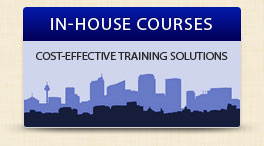 Risk Analysis and FMEA for Medical Devices
Risk Analysis and FMEA for Medical Devices
Overview
Delivered in-house, this interactive and practical workshop is designed to examine all steps of the risk management process. Risk assessment involves risk analysis and risk evaluation, followed by risk control and finally post-production information gathering. Participants will review the application of this risk management process in the standard ISO 14971 to medical devices and the use of Failure Mode and Effects Analysis (FMEA) and FTA (Fault Tree Analysis).
Risk is a measurable factor. It is defined by safety specialists as a function of the severity of the hazard and the probability that the hazard will occur. Safety, however, can not be measured precisely. It requires a judgement by designers and production professionals acting together with management, taking account of what is technically and economically feasible. The assessment of safety involves balancing the risks that cannot be eliminated from the product against the benefit and utility of the product. These two factors (probability and severity) form the basis for a product safety profile, which provides management with information to decide whether to bring a device to market.
Risk analysis is required by FDA's Quality System Regulation (QSR) and the Annex I Essential Requirements of the European Union's three Medical Devices Directives (Active Implantable, Medical Devices and In Vitro Diagnostics). The EU requires a risk analysis for all medical device technical files, including those already on the market. Also, risk analysis does not just occur during design control, it should be applied throughout the processes for product realisation.
Course Objectives
This risk analysis workshop will develop knowledge of the risk analysis standard for medical devices ISO 14791 and how to apply it and the use of FMEA and FTA to conduct risk analysis to identify hazards, their severity and the probability they might occur. The course is designed to give participants practical applications of these methodologies to their devices.
Key Skills / Learning Objectives
Through the combination of interactive tutorials, case studies and hypothetical devices or actual company devices, our workshop will enable the delegates to:
- Apply the process to conduct risk analysis to identify hazards, their severity and the probability they might occur.
- Apply risk analysis methodologies to medical devices.
- Apply risk evaluation and risk control principles to their devices including regulatory requirements, technical costs, accident costs, liability costs and insurance costs, which affect decision making on the acceptability of risks in bringing a device to market.
Course Outline
- Expectations of the FDA and the EU in applying risk analysis to medical devices.
- Risk management requirements and the purpose of ISO 14971.
- The application of ISO 14971 to medical devices.
- The application of risk analysis methodologies such as FMEA to medical devices.
- The principles of risk management planning in developing procedures and practices to analyse, evaluate and control risks.
- Sources of information and further development
Who Should Attend?
- R&D Managers / Engineers
- RA / QA Managers / Engineers
- Management Representatives
- Members of multi-discipline Design Teams
- Members of Design Review Teams
- Sales and Marketing Management
- Product, Project, and Program Managers
- Internal Auditors
Booking and Course Fees
Fees include:
- Delegate workbook, including reference information
- Training provided by qualified and experienced tutors with extensive practical management auditing experience across a variety of manufacture and service industries
- Certificate verifying attendance and completion of course
This course is for delivery in-house only. Offering better value for money, in-house training can be customised and designed to meet specific individual and company needs.
Please Contact us to discuss your in-house requirements.
More Information
Request further informationIn-House training
Associated courses
What our customers say











